
Zbornik Radova Vizantoloskog Instituta
Scope & Guideline
Exploring the Rich Tapestry of Byzantine Studies
Introduction
Aims and Scopes
- Byzantine History and Influence:
The journal emphasizes the exploration of Byzantine history and its impact on the Serbian medieval context, including detailed studies of political, social, and cultural dynamics. - Legal History and Jurisprudence:
A significant focus is placed on the analysis of medieval law, particularly the influence of Byzantine legal principles on Serbian law, providing insights into the evolution of legal frameworks. - Art and Iconography:
The journal includes research on Byzantine art and iconography, particularly in relation to Serbian religious and cultural artifacts, highlighting the intersection of art and identity. - Epigraphy and Archaeology:
The publication features studies centered on epigraphic evidence and archaeological findings, contributing to a deeper understanding of historical narratives through material culture. - Hagiography and Literature:
An exploration of medieval Serbian hagiography and literature is central to the journal, offering perspectives on religious narratives and their societal implications.
Trending and Emerging
- Interdisciplinary Approaches:
There is a noticeable increase in studies that employ interdisciplinary methodologies, combining history, law, art, and literature to provide a more holistic understanding of medieval Serbian and Byzantine contexts. - Focus on Epigraphy and Archaeological Findings:
Recent works have increasingly highlighted the significance of epigraphic and archaeological data, showcasing their role in reconstructing historical narratives and understanding cultural exchanges. - Cultural Identity and Heritage Studies:
Emerging themes include examinations of cultural identity and heritage, particularly in relation to how Byzantine influences shaped Serbian identity during the medieval period, reflecting contemporary interests in nationalism and cultural memory. - Legal and Juridical Studies:
An uptick in articles analyzing the intersection of law and society, particularly the legacy of Byzantine law in Serbian medieval legal systems, showcases a growing interest in legal history as a lens for understanding societal structures. - Reassessment of Historical Figures and Events:
Recent papers have begun to reassess the roles of key historical figures and events, indicating a shift towards critical reevaluation of established narratives and their implications for understanding the past.
Declining or Waning
- Local Historical Narratives:
There appears to be a waning interest in localized historical narratives that do not directly connect to broader Byzantine or Serbian themes, as scholars increasingly focus on more generalized or comparative studies. - Military History:
Research specifically centered on military conflicts or battles within the medieval Serbian context has become less prominent, possibly overshadowed by more comprehensive studies of societal structures and cultural developments. - Traditional Iconography Studies:
While still relevant, traditional studies focused solely on iconography without contextual analysis of broader cultural or social implications have seen a decline, indicating a shift towards more interdisciplinary approaches.
Similar Journals

Journal of Early Christian History
Illuminating the Historical Tapestry of Early ChristianityJournal of Early Christian History, published by ROUTLEDGE JOURNALS, TAYLOR & FRANCIS LTD, is a leading academic journal dedicated to the exploration of the early Christian period, focusing on historical, religious, and cultural dynamics that shaped the faith and its followers. With an ISSN of 2222-582X and an E-ISSN of 2471-4054, this journal serves as a vital resource for researchers and scholars in the fields of History and Religious Studies, holding a solid Q2 ranking in both categories for 2023. Its diverse spectrum includes critical analyses, innovative methodologies, and interdisciplinary studies, contributing to a deeper understanding of early Christian traditions. Operating from 2-4 Park Square, Milton Park, Abingdon, OX14 4RN, Oxford, England, the journal encourages open dialogues and scholarly exchange, fostering a rich academic community. Enhance your research with cutting-edge insights, as the journal continues to uphold its commitment to excellence through rigorous peer-review and impactful disseminations in the realm of early Christian history.

Studia Ceranea
Illuminating History and Religion through Scholarly DiscourseStudia Ceranea is an esteemed academic journal published by WYDAWNICTWO UNIWERSYTETU LODZKIEGO, dedicated to advancing research in the fields of Cultural Studies, History, and Religious Studies. With an ISSN of 2084-140X and an E-ISSN matching, this journal has been a pivotal platform for scholarly dialogue since its establishment, now enjoying an Open Access format since 2016, which fosters greater accessibility of its articles. Based in Poland, Studia Ceranea has witnessed significant convergence, with publication efforts spanning from 2011 to 2024. The journal's current standing is reflected in its quartile rankings, placing it in the Q4 category for 2023 across Cultural Studies, History, and Religious Studies. Additionally, it sits at rank #1124 in History and #414 in Religious Studies within Scopus ranks, evidencing its role in the wider academic landscape. Researchers, professionals, and students alike are encouraged to engage with this journal as it continues to explore and illuminate critical themes within the humanities and social sciences.
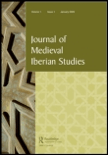
Journal of Medieval Iberian Studies
Cultivating Critical Discourse on Iberian HeritageThe Journal of Medieval Iberian Studies is a leading academic journal published by Routledge Journals, Taylor & Francis Ltd, dedicated to exploring the diverse and rich tapestry of medieval Iberian history and culture. With its ISSN 1754-6559 and E-ISSN 1754-6567, this journal serves as a vital resource for scholars engaged in the fields of cultural studies and history, attaining a prestigious Q1 ranking in both categories as of 2023. The journal is recognized for its significant contribution to the humanities, featuring peer-reviewed articles that foster innovative research and critical discourse on medieval Iberia from 2010 to 2024. Spanning an array of topics, it encapsulates interdisciplinary approaches to medieval studies, making it an essential publication for researchers, professionals, and students alike who seek to deepen their understanding of this pivotal period in history. Although it currently does not offer open access options, the journal is committed to advancing scholarly discussion and knowledge dissemination within the academic community.
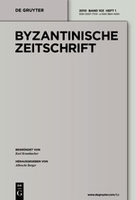
BYZANTINISCHE ZEITSCHRIFT
Unveiling the Complex Narratives of the Byzantine EraBYZANTINISCHE ZEITSCHRIFT, an esteemed publication founded in 1892, is dedicated to advancing the study of Byzantine history, literature, and the arts. Published by WALTER DE GRUYTER GMBH in Germany, this journal holds a significant place in academic discourse, evidenced by its Q2 quartile ranking in both Literature and Literary Theory, and Visual Arts and Performing Arts, as well as its Q3 ranking in History according to the 2023 category quartiles. The journal is highly regarded for its contributions to scholarly discussions and features a diverse range of articles that appeal to researchers, professionals, and students alike. With its deep historical roots and a commitment to quality scholarship, BYZANTINISCHE ZEITSCHRIFT remains a crucial resource for anyone interested in the multifaceted dimensions of the Byzantine era, covering converged years from 1892 to 2024. Engage with this journal to explore the complex narratives and rich heritage of Byzantine culture and its lasting impact on contemporary scholarship.

Images
Illuminating Cultural Dynamics Through ImagesImages, published by BRILL, serves as a significant academic platform within the realms of Cultural Studies, History, Religious Studies, and the Visual Arts and Performing Arts. With its ISSN 1871-7993 and E-ISSN 1871-8000, this journal is committed to providing a scholarly forum that engages with the complexities of visual representations and their impact on cultural narratives. Though it currently holds a Q4 category ranking across various fields, indicating room for growth, its presence in Scopus rankings showcases its contribution to the arts and humanities, positioning it as a unique voice in interdisciplinary discourse. The journal aims to publish innovative research that fosters dialogue among scholars, practitioners, and students interested in the intersections of visual culture and societal dynamics. Despite its non-open access status, Images remains a vital resource for those seeking to understand the intricate fabric of cultural expressions from historical and contemporary perspectives, offering insights that resonate across academic and artistic landscapes.
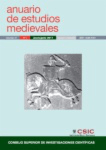
Anuario de Estudios Medievales
Illuminating the Rich Tapestry of Medieval ScholarshipAnuario de Estudios Medievales is an esteemed academic journal dedicated to the field of Medieval Studies, published by the Consejo Superior de Investigaciones Científicas (CSIC) in Spain. With an ISSN of 0066-5061 and an E-ISSN of 1988-4230, the journal has been offering open access to researchers since 1996, fostering a collaborative and inclusive scholarly environment. Recognized for its high impact, it holds a commendable Q1 ranking in History as of 2023, reflecting its influence in the academic community. The journal encompasses a rich array of topics within medieval history, making it a vital resource for historians, scholars, and students alike who seek to explore and understand the complexities of the medieval period. With its indexed presence in Scopus, where it ranks 557th among 1760 in the Arts and Humanities category, Anuario de Estudios Medievales stands as a cornerstone publication, bridging historical inquiry and contemporary research in Medieval Studies.
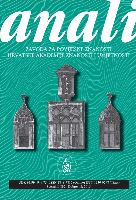
Anali Zavoda za Povijesne Znanosti Hrvatske Akademije Znanosti I Umjetnosti u Dubrovniku
Advancing Historical Knowledge in a Global ContextAnali Zavoda za Povijesne Znanosti Hrvatske Akademije Znanosti I Umjetnosti u Dubrovniku, an influential academic journal published by the Croatian Academy of Sciences and Arts, Institute of Historical Sciences in Dubrovnik, serves as a significant platform for research and discourse within the fields of history, archaeology, literature, and cultural studies. Since its transition to Open Access in 1999, the journal has broadened its reach, making scholarly content accessible to a global audience. As a result of its commitment to quality and rigor, it has achieved respectable rankings across various disciplines — notably, a Q3 in Literature and Literary Theory and Q4 in several other categories in the 2023 evaluations. Located in the picturesque city of Dubrovnik, this journal not only highlights the rich historical narrative of Croatia but also contributes to international dialogues on related subjects. Researchers, professionals, and students will find invaluable insights and contemporary discussions in its pages, offering a unique perspective on the intersections of history, culture, and the arts.

Deltion of the Christian Archaeological Society
Fostering Dialogue on the Rich Tapestry of Christian HeritageDeltion of the Christian Archaeological Society (ISSN: 1105-5758, E-ISSN: 2241-2190), published by the Christian Archaeological Society in Athens, Greece, stands as a pivotal source of scholarly work within the realm of Christian archaeology. This journal is dedicated to disseminating high-quality research that promotes the understanding of Christian history, heritage, and archaeological practices. Though it operates under traditional access options, it provides a comprehensive platform for researchers and professionals alike, fostering dialogue and collaboration within the archaeological community. With a commitment to advancing knowledge, the Deltion aims to support both established scholars and emerging voices, reinforcing the significance of archaeology in interpreting religious narratives and cultural contexts. Researchers, students, and professionals interested in the intersections of archaeology, history, and theology will find this journal an invaluable resource in their scholarly pursuits.
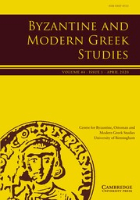
BYZANTINE AND MODERN GREEK STUDIES
Bridging Byzantine Legacy with Modern IdentityBYZANTINE AND MODERN GREEK STUDIES, published by Cambridge University Press, is a premier journal dedicated to the exploration of Byzantine and modern Greek history, literature, culture, and linguistics. With an ISSN of 0307-0131 and an E-ISSN of 1749-625X, the journal has established itself as a significant contribution to the field since its inception in 1975, with converged publication years extending to 2024. It currently holds a commendable ranking in various categories, including Q2 in Cultural Studies and History, as well as Q1 in Literature and Literary Theory, reflecting its academic rigor and impact. Researchers and scholars can access a wealth of knowledge that highlights the intricate connections between Byzantine heritage and modern Greek identity, all while benefiting from the journal's high visibility in indexes such as Scopus, which ranks it favorably within the top percentiles of related fields. The journal's commitment to fostering interdisciplinary dialogue makes it an invaluable resource for those seeking to deepen their understanding and appreciation of Greece's historical and cultural narrative.

Vizantiiskii Vremennik
Celebrating the Artistic and Cultural Richness of ByzantiumVizantiiskii Vremennik is a prestigious academic journal dedicated to the field of Byzantine studies, published by the esteemed ROSSIISKAYA AKAD NAUK, IZDATELSTVO NAUKA. With its ISSN 0132-3776, this journal serves as a vital platform for scholarly discourse, exploring the rich historical, cultural, and artistic legacy of the Byzantine Empire. Despite the absence of open access options, Vizantiiskii Vremennik provides valuable insights through meticulously peer-reviewed articles, making it essential reading for researchers, historians, and students engaged in classical studies and related disciplines. The journal prides itself on fostering a deeper understanding of Byzantine civilization, promoting interdisciplinary approaches, and contributing to the broader research community dedicated to this pivotal era in history. The publication's commitment to high academic standards ensures its importance in the scholarly landscape, making it a recommended source for anyone pursuing knowledge in this influential field.